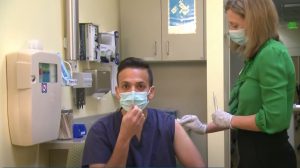NEW YORK (Reuters Health) – Augmenting antipsychotic treatment with citalopram can reduce suicidal ideation in schizophrenic patients with subthreshold depressive symptoms, a new study shows.
And among patients with no suicidal ideation at baseline, citalopram did not increase the risk of treatment-emergent suicidal thoughts compared to placebo, according to the March 9th online report in the Journal of Clinical Psychiatry.
Dr. Sidney Zisook of the University of California, San Diego in La Jolla and his colleagues write, “This is the first large, controlled study of which we are aware that shows that (selective serotonin reuptake inhibitors, or SSRIs) might also play a role in suicide prevention, by reducing suicidal ideation, in patients with schizophrenia and schizoaffective disorder.”
Most people with schizophrenia report suicidal ideation, and suicide is the chief cause of premature death in schizophrenics, the authors say. They add that most schizophrenic patients have depressive symptoms, and some experts “have argued that depression should be considered a core component of schizophrenia.”
Schizophrenic patients often receive antidepressants even if they do not experience major depression, and while this treatment appears to help relieve depressive and negative symptoms, the effect of these drugs on suicidality is unknown, Dr. Zisook and his colleagues note.
To investigate, they conducted a secondary analysis of a trial that compared citalopram to placebo for relieving depressive and negative symptoms in adults with schizophrenia or schizoaffective disorder.
In their initial report of that study, patients’ scores on suicide-related items in the Hamilton Depression Rating Scale or the Calgary Depression Rating Scale showed no evidence for an increase in suicidality.
In the new analysis, the authors provide additional data from the Beck Hopelessness Scale, the Beck Scale of Suicidal Ideation, the Clinical Global Impressions-Severity of Suicide scale (CGI-SS), and the InterSePT Scale for Suicidal Thinking (ISST).
The intent-to-treat group included 198 patients, ages 41 to 75, whose psychotic symptoms had begun an average of 25 years earlier. Forty-seven percent had a history of suicide attempts, while 21% to 37% had some suicidal ideation at baseline (depending on which scale was used).
In the citalopram group, 39% had suicidal ideation at baseline, compared to 18% after 12 weeks of treatment, based on the ISST. The percentage of patients with emergent suicidal ideation was smaller with citalopram than with placebo on both the ISST and the CGI-SS, although the differences were not statistically significant.
Two-thirds of citalopram-treated patients with suicidal ideation at baseline were free of suicidal ideation when the study ended, compared to 29% of patients with initial suicidal ideation in the placebo group. The researchers also found that citalopram responders (those with at least a 50% improvement on the Calgary Depression Rating Scale) were much more likely to have no suicidal ideation after treatment.
“Our findings reinforce the complexity and frequency of suicidal ideation and behaviors in patients with schizophrenia and schizoaffective disorder,” the researchers write. “They also underscore the importance of maintaining careful surveillance and treating depressive symptoms as vigorously as necessary to attain meaningful response.”
Reference:
J Clin Psychiatry 2010.




